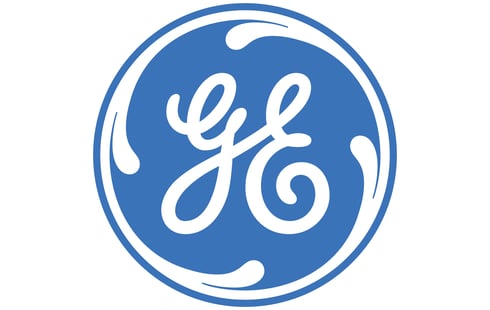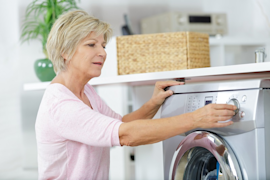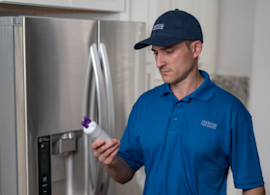GE front-load washer error codes

These error code explanations can help you diagnose a problem with your GE front-load washer.
GE error codes on your washer flash on the control panel when the control detects a failure. Look up the cause of GE error codes for your washer on the chart below and follow the troubleshooting tips to fix the problem.
GE washer error codes E31 and E42 are common codes that you may see on your front-load washer. The E31 error code indicates that the washer is draining slowly. Check the drain trap for debris or coils that can clog the drain pump. Follow the other troubleshooting tips in the chart below if the drain trap is clear. The GE washer error code E42 often appears when you overload the washer. Pull some items out and restart the washer to fix that problem. If the code reappears, follow the additional troubleshooting steps described in the chart below to fix the problem causing the E42 error code.
For repair how-to help, visit the PartsDirect repair help section, which includes repair help for washing machines, other major appliances, lawn and garden equipment, garage door openers, vacuum cleaners and more. Search for your model number to find a complete list of replacement parts for your washer.
When you need [GE service](https://www.searshomeservices.com/repair/ge) to fix an appliance problem, schedule your repair though Sears Home Services. We fix GE appliances fast.
No fill or slow fill
Make sure that both water supply valves behind the washer are fully open. In winter, check the fill lines for freezing. Check the drain system for a siphon problem. If the water inlet valve assembly is defective, replace it.
Washer overfilled with water
Unplug the washer and, if the washer is overfilled with water, check the water inlet valve assembly for proper shutoff of water flow. Replace the water inlet valve assembly if the washer continues to fill with water while electrical power is disconnected. If the washer is empty when this error code appears, replace the water level sensor.
No drain
Remove excess suds; the washer can't drain excessively sudsy water. Unplug the washer and check the large-item filter in the drain pump for a clog. If the drain pump is defective, replace it.
Draining timed out
Unplug the washer and check the large item filter in the drain pump for a clog. If the drain pump is defective, replace it.
Dispenser error
The dispenser can't move into position. You usually hear the dispenser system shifting constantly before this code is displayed. Unplug the washer and check the mechanical linkage on the dispenser housing. Repair or replace any damaged parts.
Dispenser won't move
The dispenser can't move into position or the dispenser switches aren't opening and closing. Unplug the washer and check the mechanical linkage on the dispenser housing. Repair or replace any damaged parts.
Drive motor drawing too much current
Reduce the size of the load if the washer is too full. Rotate the spin basket to see if it spins freely. Remove any foreign objects trapped between the spin basket and the outer plastic tub. Unplug the washer and check the drive motor for loose wiring connections. If the wiring connections are okay, replace the drive motor. If the problem persists, replace the inverter control board, which is next to the motor and manages drive motor speed.
Inverter control board defective
The main control board detects a defect in the inverter control board, which manages the drive motor speed. Replace the inverter control board.
Drive motor overheating
Unplug the washer and reconnect any loose wiring connections to the drive motor. If the wiring connections are okay, replace the drive motor.
Inverter control board is overheating
Unplug the washer and reconnect any loose wiring connections to the drive motor. If the wiring connections are okay, replace the drive motor because it's making the inverter control board overheat. If the problem persists, replace the inverter control board.
Drive motor defective (open winding)
Unplug the washer and reconnect any loose wiring connections to the drive motor. If the wiring connections are okay, replace the drive motor.
Drive motor overloaded
Reduce the size of the load if the washer is overloaded. Rotate the spin basket to see if it spins freely. Remove any foreign objects that may be trapped between the spin basket and the outer plastic tub. Unplug the washer and reconnect any loose wiring connections to the drive motor. If the wiring connections are okay, replace the drive motor. If the problem persists, replace the inverter control board.
Main control board failure
Unplug the washer for 3 minutes to reset the main control board. If the code returns after restoring power, unplug the washer and replace the main control board.
Door lock assembly, failure,
Check the door lock assembly for damage or a loose wiring connection. If there are no problems, replace the door lock assembly.
Water level sensor failure
Unplug the washer and reconnect any loose wiring connections on the water level sensor. Replace the wire harness if damaged. If the wiring connections are okay, replace the water level sensor.
Water temperature sensor is defective
Unplug the washer and reconnect any loose wiring connections on the water level sensor. Replace the wire harness if damaged. If the wiring connections are okay, replace the water temperature sensor.
Stuck key on the control panel
Unplug the washer for 3 minutes to reset the control board. If the code returns when you plug the washer in, replace the control panel.
Defective main control board
Unplug the washer for 3 minutes to reset the control board. If the code returns when you plug the washer in, replace the control panel.
Most common symptoms to help you fix your washers
Choose a symptom to see related washer repairs.
Main causes: broken lid switch or lid lock, bad pressure switch, broken shifter assembly, faulty control system…
Main causes: lack of electrical power, wiring failure, bad power cord, electronic control board failure, bad user interf…
Main causes: leaky water inlet valve, faulty water-level pressure switch, bad electronic control board…
Main causes: water heater failure, bad water temperature switch, faulty control board, bad water valve, faulty water tem…
Main causes: no water supply, bad water valves, water-level pressure switch failure, control system failure, bad door lo…
Main causes: worn agitator dogs, bad clutch, broken motor coupler, shifter assembly failure, broken door lock, suspensio…
Main causes: unbalanced load, loose spanner nut, worn drive block, broken shock absorber or suspension spring, debris in…
Main causes: clogged drain hose, house drain clogged, bad drain pump, water-level pressure switch failure, bad control b…
Main causes: bad lid switch or door lock, bad timer or electronic control board, wiring failure, bad water inlet valve a…
Most common repair guides to help fix your washers
Effective articles & videos to help repair your washers
Use the advice and tips in these articles and videos to get the most out of your washer.

Find tips for using your washing machine efficiently to save energy and help reduce utility bills.…

Learn about all the convenient features on our Sears PartsDirect website that make your parts purchases easier.…

Get answers to frequently asked questions about Sears and Sears PartsDirect.…